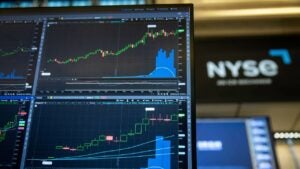Survey: Market pros see stocks recovering from tariff shock, favor international stocks over next year

The stock market has had a rough start to 2025, with the S&P 500 down about 4 percent. President Donald Trump’s tariffs announcement Wednesday afternoon sent futures plummeting as investors digest how they will impact the economy. But analysts surveyed in Bankrate’s First-Quarter Market Mavens Survey see the market heading higher over the next 12 months. They see stocks jumping about 13 percent to new highs by the end of the first quarter of 2026.
The survey’s respondents expect the S&P 500 to climb from 5,581 at the end of the survey period to 6,331 by the end of March 2026. It’s the 18th straight survey in which the market experts have predicted gains over the coming four quarters. However, the pros now favor international equities over U.S. stocks, as well as value stocks over growth stocks for the coming year.
“Volatility in financial markets since the beginning of the year could very well be a sign of things to come,” says Mark Hamrick, Bankrate’s senior economic analyst. “If nothing else, the correction registered by the S&P 500 can serve as a reminder that markets go down as well as up, recently cooling investor bullishness after two years of strong gains.”
Here are the highlights from Bankrate’s quarterly Market Mavens survey.
Forecasts and analysis:
This article is one in a series discussing the results of Bankrate’s First-Quarter 2025 Market Mavens Survey:
- Survey: Experts see the 10-year Treasury hovering around 4% a year from now despite recession fears
- Survey: Pros agree that crypto is too high risk for most investors
- Survey: Market pros see stocks recovering from tariff shock, favor international stocks over next year
Stocks to recover over next 12 months, pros say
Stocks saw strong gains in 2023 and 2024, and despite a tepid start to 2025, investment pros forecast more gains for the S&P 500, a collection of large U.S. stocks. The average estimate for the end of the first quarter 2026 is 6,331, a gain of 13.4 percent from 5,581 at the end of the survey period on March 28, 2025. That’s a jump from the 7 percent increase predicted in the fourth-quarter Bankrate survey.
Analysts see five-year returns below normal
Elevated valuations following two years of major gains could be impacting analysts’ views of stock returns over the next five years. Here are their estimates for stock market returns over the next five years, compared to the S&P 500’s average long-term returns of about 10 percent per year.
- Fifty percent said returns over the next five years will be lower than long-term returns.
- Thirty-three percent of respondents said returns will be about the same as their historical average.
- Seventeen percent said returns will be above the historical average.
Those responses showed a slight increase in those expecting lower returns over the next five years, compared with the fourth-quarter survey. Here are the results of the previous four surveys for comparison.
Many analysts pointed to high starting valuations as a reason to expect lower returns going forward, while others see the normal economic ups and downs and returns coming in around their historical averages.
“Given the high starting valuations, stocks’ returns over the next five years will probably be a little lower than normal,” says Sameer Samana, head of global equities and real assets at Wells Fargo Investment Institute. “Also, the reversal of globalization and free trade should weigh on profit margins.”
Commonwealth Financial Network Chief Market Strategist Chris Fasciano also sees five-year returns below normal. “Valuations and interest rates are starting at higher levels so we anticipate solid returns but not on par with the last 20 years,” he said.
“Five years in the current environment seems like an extra-long time,” said Patrick J. O’Hare, chief market analyst at Briefing.com. “So much can — and will — happen between now and then. It is impossible to predict, so we will fall back on the belief that returns will be about the same as their historical average.”
International stocks preferable to U.S. stocks, pros say
In a major shift from previous surveys, respondents now expect international stocks to outperform U.S. stocks over the next year.
- Forty-six percent of respondents favor international stocks over the coming year.
- Thirty-nine percent picked U.S. stocks to outperform international stocks.
- Fifteen percent said the returns between the two would be about the same.
The preference for international stocks was a divergence from the fourth quarter, when 90 percent of respondents said they expected U.S. stocks to outperform their international rivals. The third-quarter survey showed that 75 percent preferred U.S. stocks.
Cheap valuations and increased military spending, particularly in Europe, were key reasons why some analysts shifted their preference to international stocks. But there were still plenty of pros who said they liked the U.S. outlook.
“Increased stimulus in international markets, particularly on defense and infrastructure in Europe, should lead to an improving fundamental outlook in a market that has relatively cheap valuations,” Fasciano said. “This combination should attract investor interest.”
“International stocks have underperformed the S&P 500 in 12 of the past 15 years and currently trade at a 13% discount to their 10-year average relative P/E ratio (to the S&P 500),” said Sam Stovall, chief investment officer at CFRA Research.
“While political uncertainty is running high, U.S. companies still have much stronger earnings than peers in Europe or Asia,” said Dec Mullarkey, managing director of investment strategy and asset allocation at SLC Management. “Many U.S. companies are among the global leaders across various sectors. The U.S. also leads in AI investment and that should continue to pay dividends as adoption starts to accelerate.”
Wells Fargo’s Samana also continues to prefer U.S. stocks. “We still think U.S. large-cap companies are positioned to operate in the current environment and the new administration’s policies only further bolster our confidence,” he said.
Pendulum swings back toward value stocks over growth stocks
Value stocks are once again preferred over growth stocks based on return expectations over the coming year, according to the most recent survey.
- Fifty-four percent of respondents favor value stocks over growth stocks.
- Thirty-nine percent of respondents prefer growth stocks to value stocks.
- Eight percent think returns will be about the same.
Value stocks bounced back into favor this quarter after growth stocks were preferred in the Q4 survey. Lower valuations and less exposure to tariffs were some of the reasons given for the change in preference.
“With the economy slowing and inflation remaining sticky, investors will likely gravitate to the value side of the equation and enjoy the higher dividend yield offered by value stocks vs. growth stocks,” Stovall said.
“U.S. growth stocks have had a long run of outperformance, resulting in higher valuations over many of the overlooked value sectors,” says Mullarkey. “Against the backdrop of policy uncertainty, sectors such as energy, healthcare and financials have done well. Valuations are appealing and many companies in these sectors are less exposed to tariff risk as their business is primarily domestically focused.”
Still, some analysts continue to prefer growth stocks.
“We expect economic growth to be pressured over the next 12 months by tariff actions and policy uncertainty,” says Briefing.com’s O’Hare. “Lower growth will weigh on earnings growth, so there is apt to be a premium paid for high-quality growth stocks.”
“Slower future growth, due to greater uncertainty and lower government spending, tips the scales towards growth companies, especially after the recent underperformance,” said Samana.
Editorial Disclaimer: All investors are advised to conduct their own independent research into investment strategies before making an investment decision. In addition, investors are advised that past investment product performance is no guarantee of future price appreciation.
Why we ask for feedback Your feedback helps us improve our content and services. It takes less than a minute to complete.
Your responses are anonymous and will only be used for improving our website.






